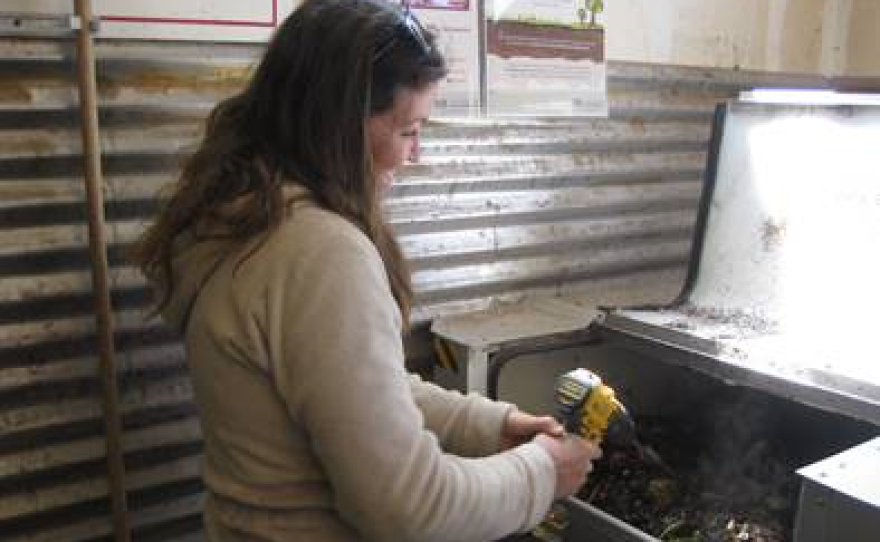Tucked into a corner of San Miguel County, one small community is embarking on a big endeavor toward sustainability. KOTO’s Katie Klingsporn has the story...
With a sole dirt road leading to it, a tiny population and a perch of nearly 10,000 feet in the rugged San Juans, Ophir is a remote mountain town that’s hardy in the truest sense of the word.
Like many mountain towns of its size, it doesn’t come with much in the way of amenities, services or frills. But what Ophir does have is an overarching goal of reducing its carbon footprint and becoming more self-reliant.
And this spring, the community took a big step in that direction, with the help of nonprofit EcoAction Partners, when it installed two hulking metal cubes inside its waste facility. Though they resemble giant shiny blocks, the cubes are actually state-of-the-art in-vessel composting systems designed specifically for small communities.
Sound of drill … Jacey quote: “I can stir it, it’s like, you can pull up the stuff from the bottom …”
That’s Ophir resident Jacey Depriest stirring the dark mixture of kitchen waste and wood chips with a drill augur. The mixture has filled the 900-pound-capacity cube in just its first month of use. It’s deep brown and thick, throwing off both steam and pungent odors of decaying organic matter. All the signs of compost in creation.
Quote: “It steams up your glasses when you dump your compost …”
Welcome to Ophir’s new community composting service. The project runs on the volunteer labor of Ophir families, the pair of grant-funded Earth Cube composting units and the organic waste coming out of the high-altitude households of this town.
The project came about when EcoAction Partners began researching a home for a pilot composting project in the region. It looked into several locations, and discovered that Ophir’s Self Reliance Committee already had a goal of launching its own community composting program. EcoAction’s Executive Director Heather Knox says that with a motivated populace and a uniquely remote location, Ophir was the ideal candidate. She applied for a grant from the Colorado Department of Public Health and Environment.
Quote: “I would say just in general it was a really easy grant to write because Ophir is so compelling …”
The grant was awarded; EcoAction was given $9,000, money it used to purchase the Earth Cubes and install them in Ophir’s waste barn. The project was then handed off to the community.
Here’s how it works. Households sign a pledge agreeing to use the system responsibly, and are given buckets to collect organic matter and kitchen scraps. They bring their buckets to the waste barn, weigh and log their waste, toss it in the cube and add brown matter. Everything from eggshells to onion tops, grass clippings and fruit rinds are compostable. Once the units’ lids are closed, the cubes collect excess moisture and add additional oxygen, which keeps the waste decomposing at a rapid clip. And once it turns into crumbly black compost, it’s cured before it’s ready for the garden bed.
So far, so good. The community has embraced it overwhelmingly, using it regularly and singing its praises.
Municipal composting services are nothing new in urban populations, but the logistics and costs make them rare in small communities — and particularly mountain towns, where space is lacking, equipment is expensive and bear and other wildlife conflicts pose problems.
Which is a much-lamented fact, because the benefits of composting are huge. It reduces the amount of waste being transported to the landfill, which in the case of Ophir, entails trips of 70 miles. It also reduces landfill emissions. And the nutrient-dense mixture is highly beneficial for garden beds.
Knox says waste audits conducted by EcoAction show that about 30 percent of regional household waste can be composted. In the town of Ophir, EcoAction estimates, composting will eliminate 16.5 metric tons of organic waste annually from the landfill.
Quote: “and so, if we are trucking less of that waste and can use it on site, that is the goal …”
The initial plan is to keep the waste in the community in a loop of re-use. The compost will be used to enrich the plots inside the town’s greenhouse, its outdoor beds and further down the road, the hope is, a community grow dome. Here’s Town Manager Randy Barnes, walking through the garden.
Quote: “Yeah and the more we can grow, the better …”
For EcoAction Partners, Ophir is just the beginning of what it hopes becomes a regional composting network.
Quote: “That was always kind of the grand vision …”
In that way, it could resemble the first seed in a larger system of waste reduction, food production and soil regeneration.
--For Western Slope Resources Reporting, I’m Katie Klingsporn




